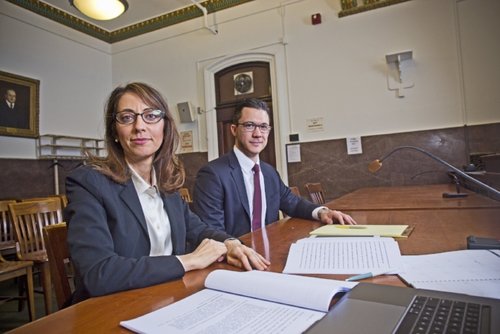The Collective Knowledge Doctrine in PA
Commonwealth v. Yong
Philadelphia Criminal Defense Lawyer Zak Goldstein
The Pennsylvania Supreme Court has just decided the case of Commonwealth v. Yong, holding that an investigating officer’s knowledge of facts sufficient to establish probable cause may be imputed to a second officer who arrests the suspect when the officers are working as a team. This is true even when the arresting officer has no individual knowledge of the facts giving rise to probable cause.
In Yong, Philadelphia Police Officers conducted a narcotics investigation targeting the 2300 block of North Fairhill Street in Philadelphia. Police Officer Joseph McCook (the "eyes" of the operation) and his partner conducted surveillance on September 21, 22nd, and 23rd of 2011. While conducting the surveillance, they observed Yong make a number of exchanges of United States currency for small objects which they believed to be drug transactions in which Yong was the seller. Based on the alleged drug activity observed during the three-day surveillance, Officer McCook obtained a search warrant for a property that was involved in these transactions. The officers returned to execute the search warrant later in the day on the 23rd. The warrant team included Police Officer Gerald Gibson. Officer Gibson had not been present for any of the surveillance and had no knowledge of Yong or Yong’s alleged involvement in any drug sales.
Relying on the search warrant, police entered the house located at 3202 North Fairhill Street. Officer McCook, who had witnessed the alleged drug sales, was towards the rear of the group. When the officers entered the house, Yong was standing in the living room. Officer Gibson, who had never seen Yong before, grabbed Yong, patted him down, and found a .38 caliber revolver in Yong’s waistband. The search of the property also led to the recovery of drug paraphernalia, including new and unused packaging.
Possession with the Intent to Deliver and Gun Charges
The Commonwealth charged Yong with Possession with the Intent to Deliver, Criminal Conspiracy, and various gun charges including firearms not to be carried without a license and persons not to possess a firearm. Yong’s defense attorney moved to suppress the firearm, arguing that Officer McCook’s probable cause could not be imputed to Officer Gibson because Officer Gibson was not part of the prior narcotics surveillances. This was important because Pennsylvania appellate courts have long held that even where officers have a search warrant for a home, the officers need specific probable cause or reasonable suspicion to search the occupants of the home unless the occupants are identified or described in the search warrant. Because Officer Gibson did not know anything about Yong and Yong was not identified as a person to be searched by the search warrant, the defense argued that Officer Gibson had violated Yong’s rights by patting him down without reasonable suspicion or probable cause. The defense argument relied on the fact that Officer McCook had not specifically directed Officer Gibson to search or arrest Yong because Pennsylvania courts have also held that an officer who does not have probable cause may conduct a search or make an arrest when specifically directed to do so by an officer who does have probable cause.
The Criminal Appeal
The trial court denied the motion to suppress. The trial court found that Officer McCook’s knowledge and probable cause could be imputed to Officer Gibson, and the Pennsylvania Supreme Court ultimately agreed. The Court recognized the bad incentives that the decision could create for police officers in that it encourages officers who are working together to take a chance and conduct a search or make an arrest and hope that one of the other officers will later turn out to have reasonable suspicion or probable cause. The Court attempted to limit this incentive and its holding by limiting the application of the decision to the narrow facts of this case.
What is the Collective Knowledge Doctrine?
The Court held that the officer who does not have reasonable suspicion or probable cause may conduct the search or seizure only where that officer is specifically working as part of the same team and is near the officer who made the original observations. The Court rationalized its holding by suggesting that Yong’s arrest was inevitable. Officer McCook had observed Yong engaged in drug sales, so even if Officer Gibson had not arrested Yong, Officer McCook would have arrested Yong once he got into the house and saw him. This is an extension of the existing inevitable discovery doctrine. However, the Court was clear that it is not sufficient for officers to be part of the same police force or to be independently investigating the same criminal conduct. The officers must actually be working together and nearby, and one of the officers must have the requisite level of suspicion. In that limited situation, an officer does not violate a suspect’s rights by conducting a search or arrest. Although this opinion does create bad incentives for police officers to gamble on a potentially illegal search, it is relatively limited as it probably does not represent a substantial expansion of the inevitable discovery doctrine.
Facing Drug or Gun Charges? We Can Help
Philadelphia Criminal Lawyers
The Philadelphia criminal defense lawyers of Goldstein Mehta LLC will fight for your rights at trial or on appeal. Our attorneys have successfully defended thousands of cases in Philadelphia and the surrounding counties, and we can help with all types of state and federal charges in Pennsylvania and New Jersey. We offer a free 15-minute criminal defense strategy session. Call 267-225-2545 to speak with a top-rated defense attorney today.


